新人教版-七年级英语下册知识点全总结
人教版七年级英语下册各知识点归纳总结
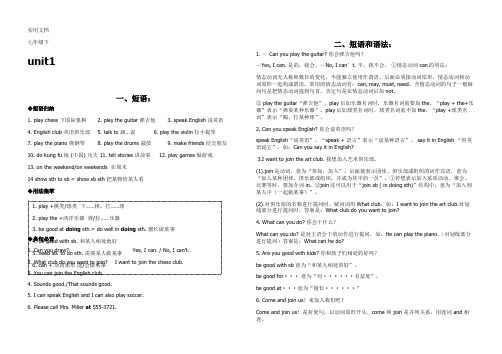
七年级下unit1一、短语:◆短语归纳1. play chess 下国际象棋2. play the guitar 弹吉他3. speak English 说英语4. English club 英语俱乐部5. talk to 跟…说6. play the violin 拉小提琴7. play the piano 弹钢琴8. play the drums 敲鼓9. make friends 结交朋友10. do kung fu 练 (中国) 功夫 11. tell stories 讲故事 12. play games 做游戏13. on the weekend/on weekends 在周末14 show sth to sb = show sb sth 把某物给某人看◆用法集萃◆典句必背1. Can you draw? Yes, I can. / No, I can’t.2. What club do you want to join? I want to join the chess club.3. You can join the English club.4. Sounds good./That sounds good.5. I can speak English and I can also play soccer.6. Please call Mrs. Miller at 555-3721.二、短语和语法:1. — Can you play the guitar? 你会弹吉他吗?—Yes, I can. 是的,我会。
—No, I can’t. 不,我不会。
①情态动词can的用法:情态动词无人称和数目的变化,不能独立使用作谓语,后面必须接动词原形,情态动词和动词原形一起构成谓语。
常用的情态动词有:can, may, must, need。
含情态动词的句子一般疑问句是把情态动词提到句首,否定句是在情态动词后加not。
人教版七年级下册英语语法知识点归纳总结
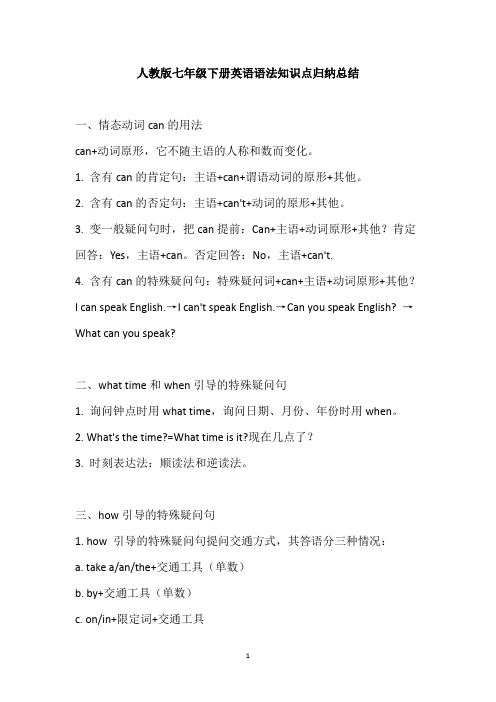
人教版七年级下册英语语法知识点归纳总结一、情态动词can的用法can+动词原形,它不随主语的人称和数而变化。
1. 含有can的肯定句:主语+can+谓语动词的原形+其他。
2. 含有can的否定句:主语+can't+动词的原形+其他。
3. 变一般疑问句时,把can提前:Can+主语+动词原形+其他?肯定回答:Yes,主语+can。
否定回答:No,主语+can't.4. 含有can的特殊疑问句:特殊疑问词+can+主语+动词原形+其他?I can speak English.→I can't speak English.→Can you speak English? →What can you speak?二、what time和when引导的特殊疑问句1. 询问钟点时用what time,询问日期、月份、年份时用when。
2. What's the time?=What time is it?现在几点了?3. 时刻表达法:顺读法和逆读法。
三、how引导的特殊疑问句1. how 引导的特殊疑问句提问交通方式,其答语分三种情况:a. take a/an/the+交通工具(单数)b. by+交通工具(单数)c. on/in+限定词+交通工具---How do you go to school every day?---I take a bus to go to school every day./I go to school by bus every day./I go to school on the bus every day.2. how far 用来提问距离,多远,其答语分为两种:(1)用长度单位表示:It is five kilometers.(2)用时间表示:It’s twenty minutes’walk.3. how long 用来提问时间,意为多久回答常用“for+段时”。
Unit1短语归纳人教版七年级英语下册

人教版七年级下册Unit 1 Can you play theguitar?知识点归纳一、重点短语1.play the guitar 弹吉他2.want to do sth 想要做某事3.the art club艺术俱乐部4.the swimming club 游泳俱乐部5.join the music club 参加音乐俱乐部6.play chess下棋7.speak English 讲英语8.what club哪种俱乐部9.like to do sth 喜欢做某事10. a sports club 体育俱乐部11.what sports 什么运动12.play sports=do sports 做运动13.be good at擅长=do well in14.be good for 对...有益15.be good with sb 善于和某人相处16.tell stories 讲故事17.story telling club讲故事俱乐部18.sound good听起来很好19.play basketball打篮球20.play tennis 打网球21.play soccer 踢足球22.play volleyball打排球23.write stories 写故事24.students wanted 招聘学生25.school show 学校演出26.talk to sb和某人说27.talk with sb 和某人交谈28.after school 放学后29.do kongfu 表演功夫30.the sound of...的声音31.play the violin 演奏小提琴32.play the drums打鼓33.play the piano弹钢琴34.play pingpong 打乒乓球35.play games with sb 和某人做游戏36.be in the school music club 在学校音乐俱乐部37.help sb (to) do sth 帮助某人做某事38.help sb with sth 在某方面帮助某人39.with the help of 在某人的帮助下40.need sth需要某物41.need sb to do sth 需要某人做某事42.the old people’s home 敬老院43.be free=have time 有时间44.in July 在七月45.tell sb sth=tell sth to sb46.make friends =make a friend47.call sb at+ 号码给某人打48.be busy doing sth 忙于做某事49.be busy with sth 忙于某事50.Englishspeaking students 讲英语的学生51.have time to do sth 有时间做某事52.on the weekend 在周末53.teach music 教音乐54.teach sb sth 教某人某物55.school concert 学校音乐会二、重点句式1.Can you play the guitar?Yes, I can.\No,I can’t.2.I want to join the art club.3.What club do you want to join?4.What sports can you play?5.You are very good at telling stories.6.Can you sing or dance?7.You can be in our school music festival.三、知识点归纳1.can 情态动词,无人称和数的变化can +do一般疑问句把can 提前,回答也用can2.play +the +乐器play + 球类/棋类3.draw 动词,同义词paint4.want to do sth 想要做某事=would like to do sth5.what club 哪种俱乐部,类似用法what color/What sports6.what about=how about+doing...怎么样?表示提建议类似用法:Shall we+do?Let’s do sth.Why not +do?=Why don’t you +do?7.be good at 擅长=do well in =be strong in doing8.sound 感官动词,听起开,后加形容词其他感官动词:look 看起来taste 尝起来smell闻起来feel 感觉起来9.Can you sing or dance? 选择疑问句,通常选其中一个回答,也可以都喜欢或都不喜欢。
新人教版七年级下册英语知识点总结
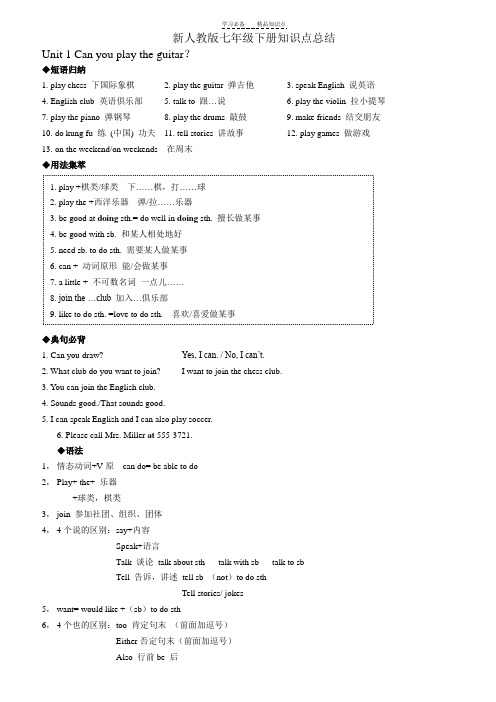
新人教版七年级下册知识点总结Unit 1 Can you play the guitar?◆短语归纳1. play chess 下国际象棋2. play the guitar 弹吉他3. speak English 说英语4. English club 英语俱乐部5. talk to 跟…说6. play the violin 拉小提琴7. play the piano 弹钢琴8. play the drums 敲鼓9. make friends 结交朋友10. do kung fu 练(中国) 功夫11. tell stories 讲故事12. play games 做游戏13. on the weekend/on weekends 在周末◆用法集萃1. play +棋类/球类下……棋,打……球2. play the +西洋乐器弹/拉……乐器3. be good at doing sth.= do well in doing sth. 擅长做某事4. be good with sb. 和某人相处地好5. need sb. to do sth. 需要某人做某事6. can + 动词原形能/会做某事7. a little + 不可数名词一点儿……8. join the …club 加入…俱乐部9. like to do sth. =love to do sth. 喜欢/喜爱做某事◆典句必背1. Can you draw? Yes, I can. / No, I can’t.2. What club do you want to join? I want to join the chess club.3. You can join the English club.4. Sounds good./That sounds good.5. I can speak English and I can also play soccer.6. Please call Mrs. Miller at 555-3721.◆语法1,情态动词+V原can do= be able to do2,Play+ the+ 乐器+球类,棋类3,join 参加社团、组织、团体4,4个说的区别:say+内容Speak+语言Talk 谈论talk about sth talk with sb talk to sbTell 告诉,讲述tell sb (not)to do sthTell stories/ jokes5,want= would like +(sb)to do sth6,4个也的区别:too 肯定句末(前面加逗号)Either否定句末(前面加逗号)Also 行前be 后As well 口语中(前面不加逗号)7,be good at+ V-ing=do well in 擅长于be good for 对…有益(be bad for对…有害)be good to 对…友好(good 可用friendly,nice,kind替换)be good with和…相处好=get on/ along well with8,特殊疑问句的构成:疑问词+一般疑问句9,How/ what about+V-ing …怎么样?(表建议)10,感官动词(look, sound, taste, smell, feel)+adj/ like11,选择疑问句:回答不能直接用Yes或者No,要从中选择一个回答12,students wanted for school show(wanted表示招募,含有被动意义)13,show sth to sb=show sb sth give sth to sb=give sb sth14,help sb (to)do sthHelp sb with sthWith sb’s help= with the help of sbHelp oneself to 随便享用15,be busy doing sth/ be busy with sth16,need to do sth17,be free= have time18,have friends= make friends19,call sb at +电话号码20,on the weekend= on weekends21,English-speaking students 说英语的学生(带有连词符,有形容词性质)22,do kung fu表演功夫◆话题写作Dear Sir,I want to join your organization (组织) to help kids with sports, music and English. My name is Mike. I am 15 years old. I’m a student in No. 1 Middle school. I can play the guitar well. I can sing many songs. I can swim and speak English well, too. I think I can be good with the kids. I also do well in telling stories.I hope to get your letter soon.Yours,MikeUnit 2 What time do you go to school?1,问时间用what time或者whenAt+钟点at 7 o’clock at noon/ at night(during/ in the day)On+ 具体某天、星期、特指的一天on April 1st on Sunday on a cold winter morningIn +年、月、上午、下午、晚上2,时间读法:顺读法逆读法:分钟≤30用past five past eight(8:05)half past eight(8:30)分钟>30用to a quarter to ten(9:45)整点用…o’clock 7 o’clock(7:00)3,3个穿的区别:wear 表状态,接服装、手套、眼镜、香水等Put on 表动作,接服装Dress 表动作,接sb./ oneself get dressed穿衣3,感叹句:How+adj.+主谓!How+adj.+a/an +n单+主谓!What+ a/an +adj.+ n单+主谓!What+ adj.+ n复/ 不可数+主谓!4,from…to…5,be/ arrive late for6,频度副词(行前be 后)always usually often sometimes seldom hardly never7,一段时间前面要用介词forfor half an hour for five minutes8,eat/ have…for breakfast/ lunch/ dinner/ supper9,either…or10,a lot of=lots of11,it is +adj.+for sb. +to do sth. (adj.修饰to do sth.)It is important for me to learn English.it is +adj.+of sb. +to do sth. (adj.修饰sb.)It is kind/ friendly/ nice of you to help me.◆用法集萃1. at + 具体时间点在几点(几分)2. eat breakfast/ lunch/dinner 吃早饭/午饭/晚饭3. thirty\half past +基数词……点半4. fifteen\a quarter to +基数词差一刻到……点5. take a/an +名词从事……活动6. from …to … 从……到……7. need to do sth 需要做某事◆短语归纳1. what time 几点2. go to school 去上学3. get up 起床4. take a shower 洗淋浴5. brush teeth 刷牙6. get to 到达7. do homework 做家庭作业8. go to work 去上班9. go home 回家10. eat breakfast 吃早饭11. get dressed 穿上衣服12. get home 到家13. either…or… 要么…要么… 14. go to bed 上床睡觉15. in the morning/ afternoon/ evening 在上午/下午/晚上16. take a walk 散步17. lots of=a lot of 许多,大量18. radio station 广播电台19. at night 在晚上20. be late for=arrive late for 迟到◆典句必背1. What time do you usually get up? I usually get up at six thirty.2. That’s a funny time for breakfast.3. When do students usually eat dinner? They usually eat dinner at a quarter to seven in the evening.4. In the evening, I either watch TV or play computer games.5. At twelve, she eats lots of fruit and vegetables for lunch.6. She knows it’s not good for her, but it tastes good.7. Here are your clothes.◆话题写作主题:谈论日常作息习惯My School DayI am a student. I usually get up at seven, and I eat breakfast at seven thirty. Then I go to school at eight. School starts at eight thirty. I eat lunch at twelve. I go home at 17:00. I often eat dinner at 19:00 and then play the piano. I do my homework at 20:00. At 22:00, I go to bed.Unit 3 How do you get to school?1,疑问词How 如何(方式)how long 多长(时间)答语常用“(For/ about +)时间段”how far多远(距离)答语常用“(It’s +)数词+miles/ meters/ kilometers”how often多久一次(频率)答语常用“Always/ often/ every day/…”或“次数+时间”等表频率的状语How soon多快,多久以后,常用在将来时中。
人教版七年级英语下册总复习知识点考点总结归纳
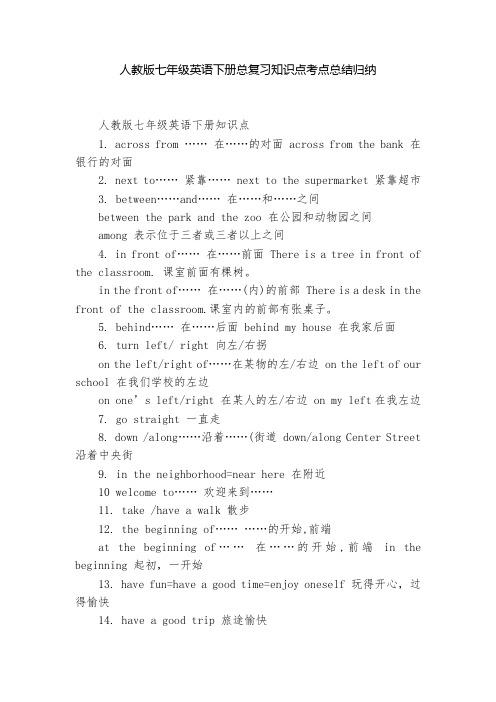
人教版七年级英语下册总复习知识点考点总结归纳人教版七年级英语下册知识点1. across from ……在……的对面 across from the bank 在银行的对面2. next to……紧靠…… next to the supermarket 紧靠超市3. between……and……在……和……之间between the park and the zoo 在公园和动物园之间among 表示位于三者或三者以上之间4. in front of……在……前面 There is a tree in front of the classroom. 课室前面有棵树。
in the front of……在……(内)的前部 There is a desk in the front of the classroom.课室内的前部有张桌子。
5. behind……在……后面 behind my house 在我家后面6. turn left/ right 向左/右拐on the left/right of……在某物的左/右边 on the left of our school 在我们学校的左边on one’s left/right 在某人的左/右边 on my left在我左边7. go straight 一直走8. down /along……沿着……(街道 down/along Center Street 沿着中央街9. in the neighborhood=near here 在附近10 welcome to……欢迎来到……11. take /have a walk 散步12. the beginning of…………的开始,前端at the beginning of……在……的开始,前端in the beginning 起初,一开始13. have fun=have a good time=enjoy oneself 玩得开心,过得愉快14. have a good trip 旅途愉快15. take a taxi 坐出租车16. 到达:get to +地方get here/ there/ home 到这/那/家 arrive in +大地方 I arrive in Beijing. arrive at +小地方I arrive at the bank. reach +地方17.go across 从物体表面横过 go across the street横过马路go through 从空间穿过 go through the forest穿过树林18.on + 街道的名称。
人教版人教版七年级下册英语知识点复习(完整版)
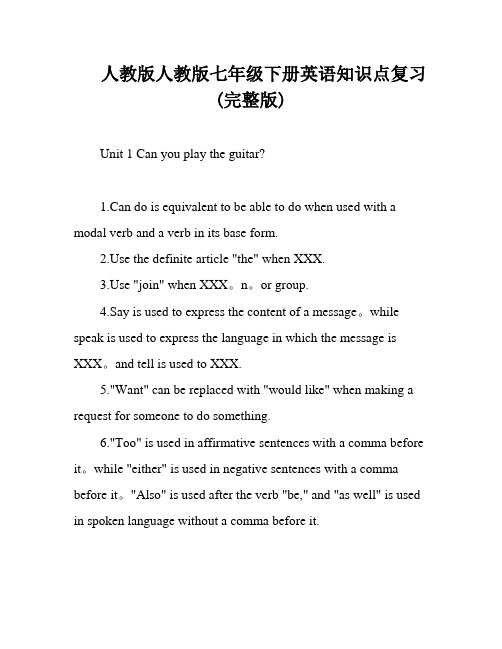
人教版人教版七年级下册英语知识点复习(完整版)Unit 1 Can you play the guitar?1.Can do is equivalent to be able to do when used with a modal verb and a verb in its base form.e the definite article "the" when XXX.e "join" when XXX。
n。
or group.4.Say is used to express the content of a message。
while speak is used to express the language in which the message is XXX。
and tell is used to XXX.5."Want" can be replaced with "would like" when making a request for someone to do something.6."Too" is used in affirmative sentences with a comma before it。
while "either" is used in negative sentences with a comma before it。
"Also" is used after the verb "be," and "as well" is used in spoken language without a comma before it.7."Be good at" is used to XXX or activity。
新人教版七年级下册英语各单元知识点总结

新人教版七年级下册英语各单元知识点总结Unit 1 Can you play the guitar?1,情态动词+V 原can do= be able to docan 的用法歌诀can 可用来表力量,但与实动不分别。
不管主语何变换, can 的模样永不变。
只要句中消灭 can,动词原形后面站。
一般疑问 can 提前,否认 can 后not 添。
2, Play+ the+ 乐器 play the violin/piano/drums (乐器前加 the)Play +球类,棋类play football play chess (球类和棋类前省略 the)3,join 参与社团、组织、团体take part in :参与运动、活动 join sb. 参加某人4, 4 个说的区分:say+内容:say it in English 用英语说它speak+语言: speak English 说英语talk 谈论 talk about sth. 谈论某事 talkwith/to sb 和某人交谈tell 告知,表达tell sb. (not)to do sth告知某人(不)去做某事(tell a story)tell stories/ jokes 讲故事/笑话5, want 的用法:想要(动词)(1) want to do sth.= would like to do sth 想要做某事(2) want (sb)to do sth.= would like +(sb)to do sth 想要做某事6, 4 个也的区分: too 确定句末(前面加逗号)either 否认句末(前面加逗号)also 句中,放在实意动词前, be 动词和情态动词之后as well 口语中(前面不加逗号)7, be good at =do well in+ V-ing/N. 擅长于(做)…… be good at playing soccer用法拓展:be good for 对…有益(be bad for 对…有害)be good to 对…友好(good 可用 friendly,nice,kind 替换)be good with 和…相处好=get on/ along well with8,特别疑问句的构成:疑问词+一般疑问句9, How/ what about+V-ing …怎么样?(表建议)What about playing basketball ? 10,感官动词(look, sound, taste, smell, feel)+adj/ like11.选择疑问句:答复不能直接用 Yes 或者 No,要从中选择一个答复Can you play the piano,,the drums,or the guitar? Ican play the drums.你会弹奏钢琴,敲鼓,或者弹吉他吗?我会打鼓12,students wanted for school show 学校演出招募学生(wanted 表示招募,含有被动意义)13,show sth to sb=show sb sth 给某人看某物 show me your book=show your book to me on show,意为“在展出”give sth to sb=give sb sth 给某人某物give me a pen =give a pen to me14,help sb (to)do sth 帮助某人做某事help sb with sth 帮助某人某事with sb’s help= with the help of sb 在某人的帮助下help oneself to 任凭享用15,be busy doing sth= be busy with sth 忙于做某事,be busy doing his homework= be busy with his homework 忙于他的家庭作业116,sb. need to do sth 某人需要做某事 need sb. to do sth 需要某人做某事17,be free= have time 有空的be busy 劳碌的18,make friends 交朋友 make friends with sb.与某人交朋友19,call sb at +电话号码给某人打---电话20,on the weekend= on weekends 在周末21,English-speaking students 说英语的学生(带有连词符,有形容词性质)22,do kung fu 表演功夫23,in, on 和at 在表达时间方面的区分①in+年、月、季节;泛指在上午,下午,晚上,如: inthe morning(afternoon, evening). in spring 在春季in September 在九月②on 指在某一天或某一天的上午,下午,晚上,具体到某一天、节日如: on Monday, on Sunday afternoon, on July 1, 1999 on New Year’s Day③at,一般表示点时间,如 at six o’clock, at three thirty.、习惯用法: at night, at noon,留意:在英语中,假设时间名词前用 this, last, next 等修饰时,像这样的表示,“在某时”的时间短语前,并不需要任何介词。
人教版七年级英语下册单元知识点总结(全册)
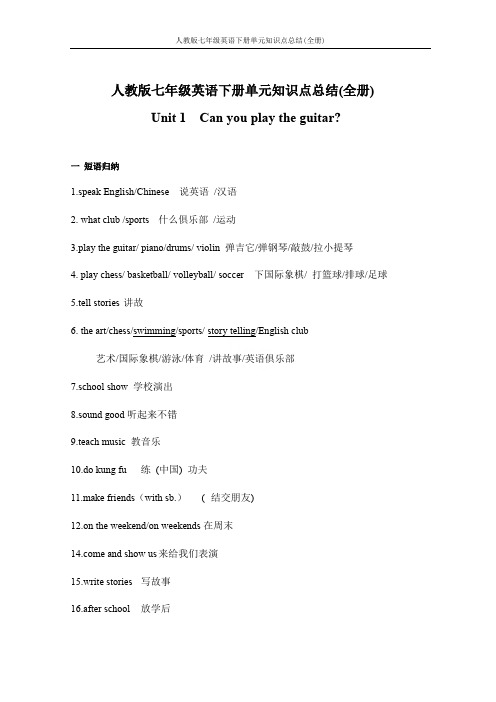
人教版七年级英语下册单元知识点总结(全册)Unit 1 Can you play the guitar?一短语归纳1.speak English/Chinese 说英语/汉语2. what club /sports什么俱乐部/运动3.play the guitar/ piano/drums/ violin 弹吉它/弹钢琴/敲鼓/拉小提琴4. play chess/ basketball/ volleyball/ soccer 下国际象棋/ 打篮球/排球/足球5.tell stories讲故6. the art/chess/swimming/sports/ story telling/English club艺术/国际象棋/游泳/体育/讲故事/英语俱乐部7.school show 学校演出8.sound good听起来不错9.teach music 教音乐10.do kung fu练(中国) 功夫11.make friends(with sb.)(结交朋友)12.on the weekend/on weekends在周末e and show us来给我们表演15.write stories写故事16.after school放学后17.English-speaking students说英语的学生18.play games 做游戏19.the Students’ Sports Center学生运动中心20.at the old people’s home在老人之家21.be in our school music festival 参加学校音乐节22.jion the music club加入音乐俱乐部二用法集萃1. play +棋类/球类下……棋,打……球2. play the +乐器弹/拉……乐器3. be good at doing sth.擅长做某事be good for.. 对… 有好处be good /kind to … 对… 友好4. be good with sb. 和某人相处地好; 善于应付(处理)…5. need(sb./sth.)to do… 需要(某人/某物)做….6. can + 动词原形能/会做某事7. a little + 不可数名词: 一点儿……9. like to do sth.或like doing sth. 喜欢做某事10.want to do…想做……11.What about…?…怎么样?(后面接Ving/代词/名词)12. talk用法: talk to/with sb. 跟某人说话talk about sth. 谈论某事tell 用法:tell sb sth. 告诉某人某事tell sb to do sth 告诉某人去做某事tell stories 讲故事say用法:say直接加说话的内容/itspeak用法:speak +语言13.help sb. with sth在某方面帮助某人= help sb.(to)do sth14.be free /busy有空/很忙15. call sb. at+号码拨打某人的……号码16. be in=join …成为…中的一员(P6)17.want …for the school show为学校表演招聘……三典句必背1. Can you draw? 你会画画吗?Yes, I can. / No, I can’t.是,我会。
新人教版七年级英语下册知识点归纳总结

新人教版七年级英语下册知识点归纳总结新人教版七年级英语下册知识点全总结Unit1 Can you play the guitar?短语归纳1. play chess下国际象棋2. play the guitar弹吉他3. speak English说英语4. English club英语俱乐部5. talk to跟…说6. play the violin拉小提琴7. play the piano弹钢琴8. play the drums敲鼓9. make friends结交朋友10. do kung fu练(中国)功夫11. tell stories讲故事12. play games做游戏13. on the weekend/on weekends在周末◆用法集萃1. play +棋类/球类下…棋/打…球2. play the +西洋乐器弹/拉…乐器3. be good at doing sth.= do well in doing sth.善于做某事4. be good with sb.和某人相处地好5. need sb. to do sth.需求或人做某事6. can +动词原形能/会做某事7. a little +不成数名词一点儿…8. join the…club加入…俱乐部9. like to do sth. =love to do sth.喜欢/喜爱做某事◆典句必背1.—Can you draw?你会画画吗?—Yes, I can./No, I can’t.是的,我会。
/不,我不会。
2.—What club do you want to join?你想插手哪一个俱乐部?—I want to join the chess club.我想加入国际象棋俱乐部。
3. You can join the English club.你可以加入英语俱乐部。
4. Sounds good./That sounds good.听上去很好。
人教版七年级下册英语知识点复习(完整版)

人教版七年级下册英语知识点复习(完整版) Unit 1 Can you play the guitar?1,情态动词+V原can do= be able to do2,Play+ the+ 乐器+球类,棋类3,join 参加社团、组织、团体4,4个说的区别:say+内容Speak+语言Talk 谈论talk about sth talk with sb talk to sbTell 告诉,讲述tell sb (not)to do sthTell stories/ jokes5,want= would like +(sb)to do sth6,4个也的区别:too 肯定句末(前面加逗号)Either否定句末(前面加逗号)Also 行前be 后As well 口语中(前面不加逗号)7,be good at+ V-ing=do well in 擅长于be good for 对…有益(be bad for对…有害)be good to 对…友好(good 可用friendly,nice,kind替换)be good with和…相处好=get on/ along well with8,特殊疑问句的构成:疑问词+一般疑问句9,How/ what about+V-ing …怎么样?(表建议)10,感官动词(look, sound, taste, smell, feel)+adj/ like11,选择疑问句:回答不能直接用Yes或者No,要从中选择一个回答12,students wanted for school show(wanted表示招募,含有被动意义)13,show sth to sb=show sb sth give sth to sb=give sb sth14,help sb (to)do sthHelp sb with sthWith sb’s help= with the help of sbHelp oneself to 随便享用15,be busy doing sth/ be busy with sth16,need to do sth17,be free= have time18,have friends= make friends19,call sb at +电话号码20,on the weekend= on weekends21,English-speaking students 说英语的学生(带有连词符,有形容词性质)22,do kung fu表演功夫Unit 2 What time do you go to school?1,问时间用what time或者whenAt+钟点at 7 o’clock at noon/ at night(during/ in the day)On+ 具体某天、星期、特指的一天on April 1st on Sunday on a cold winter morningIn +年、月、上午、下午、晚上2,时间读法:顺读法逆读法:分钟≤30用past five past eight(8:05)half past eight(8:30)分钟>30用to a quarter to ten(9:45)整点用…o’clock 7 o’clock(7:00)3,3个穿的区别:wear 表状态,接服装、手套、眼镜、香水等Put on 表动作,接服装Dress 表动作,接sb/ oneself get dressed穿衣3,感叹句:How+adj+主谓!How+adj+a/an +n单+主谓!What+ a/an +adj+ n单+主谓!What+ adj+ n复/ 不可数+主谓!4,from…to…5,be/ arrive late for6,频度副词(行前be 后)Always usually often sometimes seldom hardly never7,一段时间前面要用介词for for half an hour for five minutes8,eat/ have…for breakfast/ lunch/ dinner/ supper9,either…or10,a lot of=lots of11,it is +adj+for sb +to do sth (adj修饰to do sth)It is important for me to learn English.it is +adj+of sb +to do sth (adj修饰sb)It is kind/ friendly/ nice of you to help me.Unit 3 How do you get to school?1,疑问词How 如何(方式)how long 多长(时间)答语常用“(For/ about +)时间段”how far多远(距离)答语常用“(It’s +)数词 +miles/ meters/ kilometers”how often多久一次(频率)答语常用“Always/ often/ every day/…”或“次数+时间”等表频率的状语How soon多快,多久以后,常用在将来时中。
新人教版英语七年级下册1-12单元知识点归纳

Unit 1 Can you play the guitar?语言点梳理一、语法:情态动词:有一定意义,表示说话人的语气或情态,但不能单独作谓语,只能和其他动词原形一起构成谓语,没有人称和数的变化。
否定形式是在情态动词后面加上not。
变一般疑问句要把情态动词提到句子的开头,即:情态动词+主语+动词原形+其他?1.肯定句:He/She/I/We/They/You/Tom+情态动词can+动词原形.2.否定句:He/She/I/We/They/You/Tom+情态动词can+not+动词原形3.一般疑问句:情态动词can+ He/She/I/We/They/You/Tom+动词原形?Yes,主语+can./No,主语+ can’t.1)表示能力,“会;能”。
eg: Can you dance? 你会跳舞吗?2)表示请求或许可,“可以”。
eg: Can I ask you a question? 我可以问你一个问题吗?1. play the guitar/piano/violin/drums弹吉他/钢琴/小提琴/敲鼓play chess下象棋 play sports 做运动play soccer/basketball踢足球、打篮球(乐器名称前加the,球类名称前不加the)2. join the art club加入艺术俱乐部/swimming club游泳俱乐部sports club运动俱乐部/story telling club讲故事俱乐部English club/ art club/ music clubjoin v.参加,加入指加入某个团体,组织,群体,并成为其中的一员。
What club do you want to join ?你想加入什么俱乐部?I want to join the swimming club.=I want to be in the swimming club.take part in 参加,加入某项活动,并在其中其积极作用。
人教版英语七年级下册Units1-4知识点总结
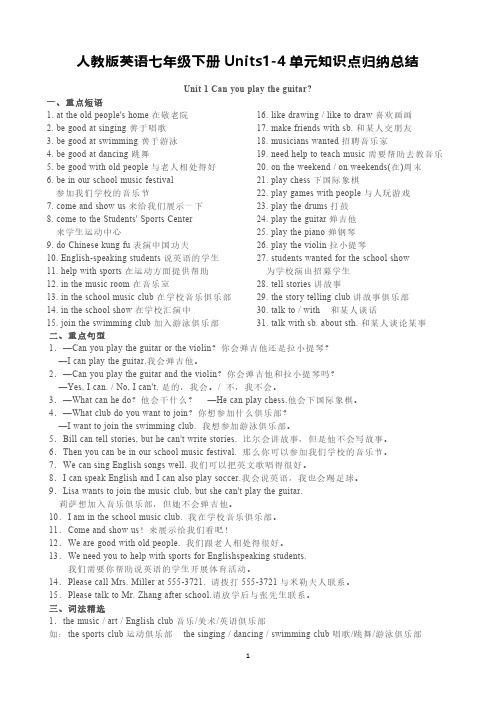
人教版英语七年级下册Units1-4单元知识点归纳总结Unit1Can you play the guitar?一、重点短语1.at the old people's home在敬老院2.be good at singing善于唱歌3.be good at swimming善于游泳4.be good at dancing跳舞5.be good with old people与老人相处得好6.be in our school music festival参加我们学校的音乐节e and show us来给我们展示一下e to the Students'Sports Center来学生运动中心9.do Chinese kung fu表演中国功夫10.English-speaking students说英语的学生11.help with sports在运动方面提供帮助12.in the music room在音乐室13.in the school music club在学校音乐俱乐部14.in the school show在学校汇演中15.join the swimming club加入游泳俱乐部16.like drawing/like to draw喜欢画画17.make friends with sb.和某人交朋友18.musicians wanted招聘音乐家19.need help to teach music需要帮助去教音乐20.on the weekend/on weekends(在)周末21.play chess下国际象棋22.play games with people与人玩游戏23.play the drums打鼓24.play the guitar弹吉他25.play the piano弹钢琴26.play the violin拉小提琴27.students wanted for the school show为学校演出招募学生28.tell stories讲故事29.the story telling club讲故事俱乐部30.talk to/with和某人谈话31.talk with sb.about sth.和某人谈论某事二、重点句型1.—Can you play the guitar or the violin?你会弹吉他还是拉小提琴?—I can play the guitar.我会弹吉他。
最新人教版七年级下册英语所有必考单词、词组大全

七年级下册英语各单元知识点大归纳Unit 1 Can you play the guitar?◆短语归纳play the guitar 弹吉他play the piano 弹钢琴play the trumpet吹喇叭play the drums 敲鼓play chess 下象棋speak English 说英语speak a little English 说一点英语say it in English 用英语说它join the art club 加入艺术俱乐部join the basketball club加入篮球俱乐部join the swimming club加入游泳俱乐部what club 什么俱乐部play the guitar well 弹吉他弹得好be good with sb和某人相处的好be good for···对······有益处be good at···擅长······help sb with sth / doing sth帮助某人干某事help kids with swimming帮助孩子们游泳do Chinese kung fu表演中国功夫be in参加,加入call sb at + 电话号码给某人打电话拨打···号have an e-mail address 有电子邮件的地址rock band 摇滚乐队a little 一点(后接不可数名词)in the music room 在音乐教室里show sth to sb = show sb sth 把某物给某人看on the weekend/on weekends 在周末◆用法集萃◆典句必背1. Can you draw? Yes, I can. / No, I can’t.2. What club do you want to join? I want to join the chess club.3. You can join the English club.4. Sounds good./That sounds good.5. I can speak English and I can also play soccer.6. Please call Mrs. Miller at 555-3721.◆话题写作Dear Sir,I want to join your organization (组织) to help kids with sports, music and English. My name is Mike. I am 15 years old. I’m a student in No. 1 Middl e school. I can play the guitar well. I can sing many songs. I can swim and speak English well, too. I think I can be good with the kids. I also do well in telling stories.I hope to get your letter soon.Yours,MikeUnit 2 What time do you go to school?◆短语归纳1. what time 几点2. go to school 去上学3. get up 起床4. take a shower 洗淋浴5. brush teeth 刷牙6. get to 到达7. do homework 做家庭作业8. go to work 去上班9. go home 回家10. eat breakfast 吃早饭11. get dressed 穿上衣12. get home 到家13. either…or… 要么…要么… 14. go to bed 上床睡觉15. in the morning/ afternoon/ evening 在上午/下午/晚上16. take a walk 散步17. lots of=a lot of 许多,大量18. radio station 广播电台19. at night 在晚上20. be late for=arrive late for 迟到◆用法集萃◆典句必背1. What time do you usually get up? I usually get up at six thirty.2. That’s a funny time for breakfast.3. When do students usually eat dinner? They usually eat dinner at a quarter toseven in the evening.4. In the evening, I either watch TV or play computer games.5. At twelve, she eats lots of fruit and vegetables for lunch..6. She knows it’s not good for her, but it tastes good.7. Here are your clothes.◆话题写作主题:谈论日常作息习惯My School DayI am a student. I usually get up at seven, and I eat breakfast at seven thirty. ThenI go to school at eight. School starts at eight thirty. I eat lunch at twelve. I go home at17:00. I often eat dinner at 19:00 and then play the piano. I do my homework at20:00. At 22:00, I go to bed.Unit 3 How do you get to school?◆短语归纳1. get to school 到达学校2. take the subway 乘地铁3. ride a bike 骑自行车4. how far 多远5. from home to school 从家到学校6. every day 每天7. take the bus 乘公共汽车8. by bike 骑自行车9. bus stop 公共汽车站10. think of 认为11. between … and … 在…和…之间12. one 11-year-old boy 一个11岁的男孩13. play with … 和…玩14. come true 实现15. have to 不得不◆用法集萃◆典句必背1. How do you get to school? I ride my bike.2. How far is it from your home to school?3. How long does it take you to get to school?4. For many students, it is easy to get to school.5. There is a very big river between their school and the village.◆话题写作主题:上学的交通方式写作思路:开篇点题:点出自己的出行方式;具体内容:自己选择这种交通方式的原因;结束语: 表明自己的观点。
人教版七年级英语下册Unit 1知识点汇总
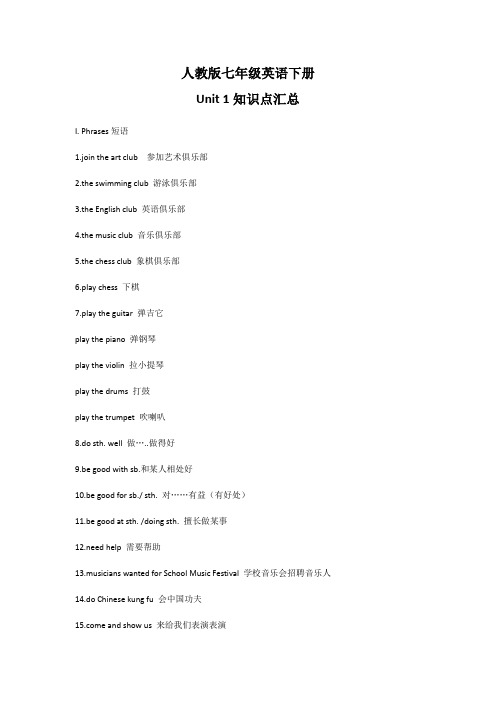
人教版七年级英语下册Unit 1知识点汇总I. Phrases短语1.join the art club 参加艺术俱乐部2.the swimming club 游泳俱乐部3.the English club 英语俱乐部4.the music club 音乐俱乐部5.the chess club 象棋俱乐部6.play chess 下棋7.play the guitar 弹吉它play the piano 弹钢琴play the violin 拉小提琴play the drums 打鼓play the trumpet 吹喇叭8.do sth. well 做…..做得好9.be good with sb.和某人相处好10.be good for sb./ sth. 对……有益(有好处)11.be good at sth. /doing sth. 擅长做某事12.need help 需要帮助13.musicians wanted for School Music Festival 学校音乐会招聘音乐人14.do Chinese kung fu 会中国功夫e and show us 来给我们表演表演16.show sb. sth./ show sth. to sb. 给某人看某物17.English-speaking students 说英语的学生18.on the weekend/at the weekendon weekends/at weekends 在周末19.tell stories 讲故事20.Students’Sports Center 学生运动中心21.make friends with sb. 和某人交朋友22.need sb. to do sth 需要某人做某事need to do sth 需要去做某事23.help wanted 招聘启事24.school show 学校公演25.in the music room在音乐教室26.a swimming pool 游泳池27.a wanted ad 招聘广告28.a fashion show 时装秀29.want sth. 想要什么want to do sth. 想要做什么want sb. to do sth. 想要某人做某事30.help sb. with sth. 在某事上帮助某人help sb. (to) do sth 帮助某人做某事II. Sentences句子1.–你会游泳吗?-不,我不会。
人教版七年级英语下册知识点
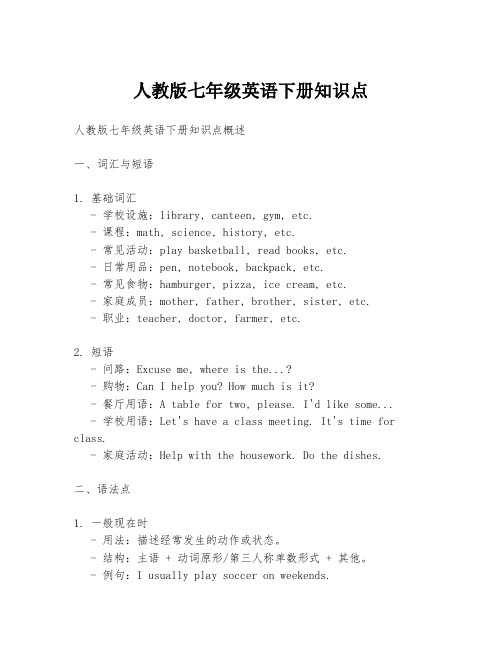
人教版七年级英语下册知识点人教版七年级英语下册知识点概述一、词汇与短语1. 基础词汇- 学校设施:library, canteen, gym, etc.- 课程:math, science, history, etc.- 常见活动:play basketball, read books, etc.- 日常用品:pen, notebook, backpack, etc.- 常见食物:hamburger, pizza, ice cream, etc.- 家庭成员:mother, father, brother, sister, etc.- 职业:teacher, doctor, farmer, etc.2. 短语- 问路:Excuse me, where is the...?- 购物:Can I help you? How much is it?- 餐厅用语:A table for two, please. I'd like some... - 学校用语:Let's have a class meeting. It's time for class.- 家庭活动:Help with the housework. Do the dishes.二、语法点1. 一般现在时- 用法:描述经常发生的动作或状态。
- 结构:主语 + 动词原形/第三人称单数形式 + 其他。
- 例句:I usually play soccer on weekends.2. 一般过去时- 用法:描述过去某一时间发生的动作或状态。
- 结构:主语 + 动词的过去式 + 其他。
- 例句:He visited his grandparents last week.3. 现在进行时- 用法:描述正在进行的动作。
- 结构:主语 + am/is/are + 动词-ing + 其他。
- 例句:She is reading a book now.4. 可数名词与不可数名词- 可数名词:可以用数字计数的名词,如:book, apple。
Unit2知识归纳人教版七年级英语下册
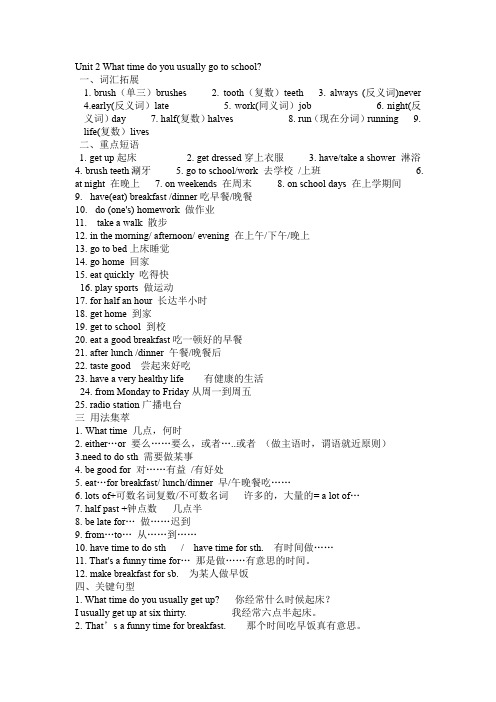
Unit 2 What time do you usually go to school?一、词汇拓展1.brush(单三)brushes2. tooth(复数)teeth3. always (反义词)never4.early(反义词)late5. work(同义词)job6. night(反义词)day7. half(复数)halves8. run(现在分词)running9. life(复数)lives二、重点短语1.get up起床2. get dressed穿上衣服3. have/take a shower 淋浴4.brush teeth涮牙5. go to school/work 去学校/上班6. at night 在晚上7. on weekends 在周末8. on school days 在上学期间9.have(eat) breakfast /dinner吃早餐/晚餐10.do (one's) homework 做作业11. take a walk 散步12. in the morning/ afternoon/ evening 在上午/下午/晚上13. go to bed上床睡觉14. go home 回家15. eat quickly 吃得快16. play sports 做运动17. for half an hour 长达半小时18. get home 到家19. get to school 到校20. eat a good breakfast吃一顿好的早餐21. after lunch /dinner 午餐/晚餐后22. taste good 尝起来好吃23. have a very healthy life 有健康的生活24. from Monday to Friday从周一到周五25. radio station广播电台三用法集萃1.What time 几点,何时2. either…or 要么……要么,或者…..或者(做主语时,谓语就近原则)3.need to do sth 需要做某事4. be good for 对……有益/有好处5. eat…for breakfast/ lunch/dinner 早/午晚餐吃……6. lots of+可数名词复数/不可数名词许多的,大量的= a lot of…7. half past +钟点数几点半8. be late for…做……迟到9. from…to…从……到……10. have time to do sth / have time for sth. 有时间做……11. That's a funny time for…那是做……有意思的时间。
人教版初一英语知识点大全精选全文完整版

可编辑修改精选全文完整版人教版初一英语知识点大全英语是我们每个初中生都要学习的科目,是三大主科之一。
但是很多初一的学生都觉得英语知识很难学。
这次小编给大家整理了人教版初一英语知识点,供大家阅读参考。
一、48个国际音标及26个英文字母的正确书写要熟练掌握元音和辅音,5个元音字母(a, e, i, o, u),字母的正确占格及单词间距。
二、be动词的用法be动词有三种变形,分别是:am, is, are。
记忆口诀:“我”用am, “你”用are, is用于“他、她、它”;单数全都用is,复数全部都用are。
三、人称及人称代词的不同形式(主格和宾格)1、三种人称:第一人称(I, we),第二人称(you, you),第三人称(he, she, it, Maria)。
2、人称代词的主格,即人称代词位于句子主语位置时的形态:I, We, You, You, He, She, It, Maria。
3、人称代词的宾格,即人称代词位于句子宾语位置时的形态:me, us, you, you, him, her, it。
4、形容词性物主代词:my, our, your, your, his, her, its, their。
5、名词性物主代词:mine, ours, yours, yours, his, hers, its, theirs。
6、反身代词:myself, ourselves, yourself, yourselves, himself, herself, itself, themselves。
四、基数词(表示数量多少的词,大致相当于代数里的自然数)zero, one, two, three, four, five, six, seven, eight, nine, ten, eleven, twelve, thirteen, fourteen, fifteen, sixteen, seventeen, eighteen, nineteen, twenty, twenty-one, twenty-two, twenty-three,twenty-four, twenty-five, twenty-six, twenty-seven, twenty-eight, twenty-nine, thirty, forty, fifty, sixty,seventy, eighty, ninety, one hundred,one hundred and one。
新版人教版七年级英语上下册各单元知识点总结完美
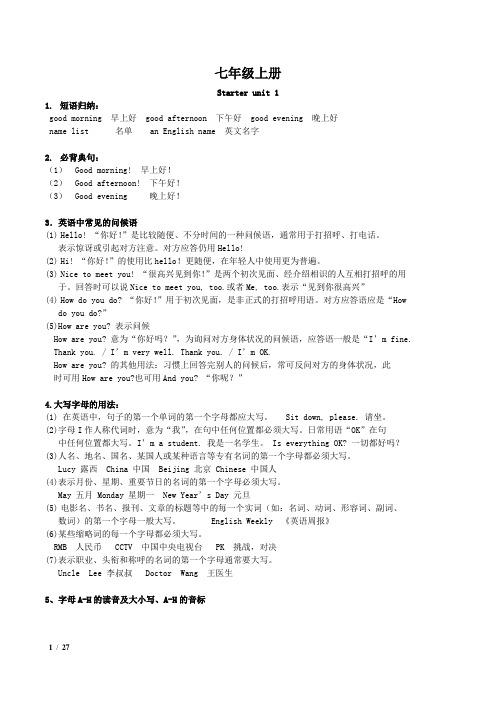
七年级上册Starter unit 11.短语归纳:good morning 早上好 good afternoon 下午好 good evening 晚上好name list 名单 an English name 英文名字2.必背典句:(1)Good morning! 早上好!(2)Good afternoon! 下午好!(3)Good evening 晚上好!3.英语中常见的问候语(1)Hello! “你好!”是比较随便、不分时间的一种问候语,通常用于打招呼、打电话。
表示惊讶或引起对方注意。
对方应答仍用Hello!(2)Hi! “你好!”的使用比hello!更随便,在年轻人中使用更为普遍。
(3)Nice to meet you! “很高兴见到你!”是两个初次见面、经介绍相识的人互相打招呼的用于。
回答时可以说Nice to meet you, too.或者Me, too.表示“见到你很高兴”(4)How do you do? “你好!”用于初次见面,是非正式的打招呼用语。
对方应答语应是“Howdo you do?”(5)How are you? 表示问候How are you? 意为“你好吗?”,为询问对方身体状况的问候语,应答语一般是“I’m fine. Thank you. / I’m very well. Thank you. / I’m OK.How are you? 的其他用法:习惯上回答完别人的问候后,常可反问对方的身体状况,此时可用How are you?也可用And you? “你呢?”4.大写字母的用法:(1) 在英语中,句子的第一个单词的第一个字母都应大写。
Sit down, please. 请坐。
(2)字母I作人称代词时,意为“我”,在句中任何位置都必须大写。
日常用语“OK”在句中任何位置都大写。
I’m a student. 我是一名学生。
Is everything OK? 一切都好吗?(3)人名、地名、国名、某国人或某种语言等专有名词的第一个字母都必须大写。
2023年新人教版七年级下册英语全册单词表含音标和释义
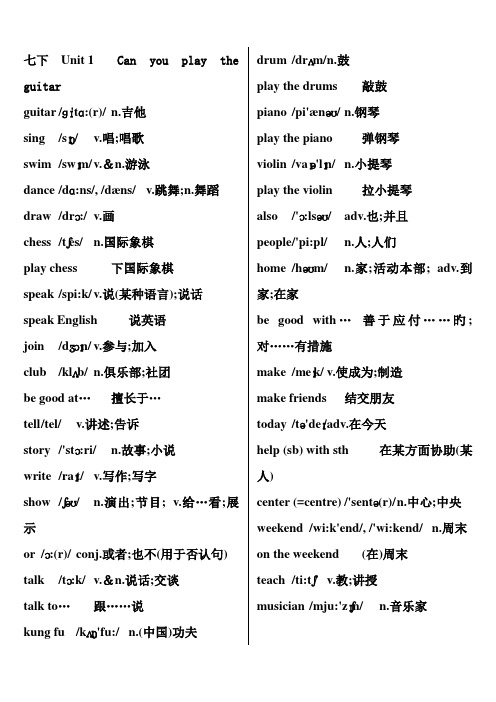
七下Unit 1 Can you play the guitarguitar /ɡɪ'tɑ:(r)/ n.吉他sing /sɪŋ/ v.唱;唱歌swim /swɪm/ v.&n.游泳dance /dɑ:ns/, /dæns/ v.跳舞;n.舞蹈draw /drɔ:/ v.画chess /tʃes/ n.国际象棋play chess 下国际象棋speak /spi:k/ v.说(某种语言);说话speak English 说英语join /dʒɔɪn/ v.参与;加入club /klʌb/ n.俱乐部;社团be good at…擅长于…tell /tel/ v.讲述;告诉story /'stɔ:ri/ n.故事;小说write /raɪt/ v.写作;写字show /ʃəʊ/ n.演出;节目; v.给…看;展示or /ɔ:(r)/ conj.或者;也不(用于否认句) talk /tɔ:k/ v.&n.说话;交谈talk to…跟……说kung fu /kʌŋ'fu:/ n.(中国)功夫drum /drʌm/ n.鼓play the drums 敲鼓piano /pi'ænəʊ/ n.钢琴play the piano 弹钢琴violin /vaɪə'lɪn/ n.小提琴play the violin 拉小提琴also /'ɔ:lsəʊ/ adv.也;并且people /'pi:pl/ n.人;人们home /həʊm/ n.家;活动本部; adv.到家;在家be good with…善于应付……旳;对……有措施make /meɪk/ v.使成为;制造make friends 结交朋友today /tə'deɪ/ a dv.在今天help (sb) with sth 在某方面协助(某人)center (=centre) /'sentə(r)/ n.中心;中央weekend /wi:k'end/, /'wi:kend/ n.周末on the weekend (在)周末teach /ti:tʃ/ v.教;讲授musician /mju:'zɪʃn/ n.音乐家七下Unit 2 What time do you go to schoolup /ʌp/ adv.向上get up 起床;站起dress /dres/ v.&n.穿衣服;连衣裙get dressed 穿上衣服brush /brʌʃ/ v.&n.刷;刷净;刷子toot. /tu:θ/ n.(pl.teet./ti:θ/)牙齿shower /'ʃaʊə(r)/ n.&v.淋浴;淋浴器(间) take a shower 洗淋浴usually /'ju:ʒuəli/ adv.一般地;一般地forty /'fɔ:(r)ti/ num.四十wow /waʊ/ int.(表达惊奇或敬佩)哇;呀never /'nevə(r)/ adv.从不;绝不early /'ɜ:(r)li/ adv.&adj.早(旳)fifty /'fɪfti/ num.五十job /dʒɒb/, /dʒɑ:b/ n.工作;职业work /wɜ:(r)k/ v.&n.工作station /'steɪʃn/ n.电(视)台;车站radio station 广播电台o'clock "/ə'klɒk/,/ə'klɑ:k/" adv.(表达整点)……点钟night /naɪt/ n.晚上;夜晚funny /'fʌni/ adj.奇怪旳;滑稽好笑旳exercise /'eksəsaɪz/ v.&n.锻炼;练习on weekends (在)周末best /best/ adj.&adv.最佳旳;最佳地;最group /ɡru:p/ n.组;群half /hɑ:f/, /hæf/ n.&pron.二分之一;半数past /pɑ:st/, /pæst/ prep.晚于;过(时间); adj.过去旳quarter /'kwɔ:(r)tə(r)/ n.一刻钟;四分之一homework /'həʊmwɜ:(r)k/ n.家庭作业do (one's) homework 做作业run /rʌn/ v.跑;奔clean /kli:n/ v.打扫;弄洁净; adj.洁净旳walk /wɔ:k/ n.&v.行走;步行take a walk 散步;走一走quickly /'kwɪkli/ adv.很快地either "/'aɪðə(r)/,/'i:ðə(r)/" adv.或者;也(用在否认词组后) either…or…要么…要么…;或者…或者…lot /lɒt/, /lɑ:t/ p ron.大量;许多lots of 大量;许多sometimes /'sʌmtaɪmz/ adv.有时taste /teɪst/ v.有…旳味道;品尝; n.味道;滋味life /laɪf/ n.(pl.live./laɪvz/)生活;生命七下Unit 3 How do you get to schooltrain /treɪn/ n.火车bus /bʌs/ n.公共汽车subway /'sʌbweɪ/ n.地铁take the subway 乘地铁ride /raɪd/ v.&n.骑;旅程bike /baɪk/ n.自行车ride a bike 骑自行车sixty /'sɪksti/ num.六十seventy /'sevnti/ num.七十eighty /'eɪti/ num.八十ninety /'naɪnti/ num.九十hundred /'hʌndrəd/ num.一百minute /'mɪnɪt/ n.分钟far /fɑ:(r)/ adv.&adj.远;远旳kilometer (=kilometre) /'kɪləmi:tə/, /kɪ'lɑ:mi:tər/ n.千米;公里new /nju:/, /nu:/ adj.新旳;刚出现旳every /'evri/ adj.每一;每个every day 每天by /baɪ/ prep.(表达方式)乘(交通工具) by bike 骑自行车drive /draɪv/ v.开车car /kɑ:(r)/ n.小汽车;轿车live /lɪv/ v.居住;生活stop /stɒp/, /stɑ:p/ n.车站;停止think of 认为cross /krɒs/, /krɔ:s/ v.横过;越过river /'rɪvə(r)/ n.河;江many /'meni/ adj.&pron.许多village /'vɪlɪdʒ/ n.村庄;村镇between /bɪ'twi:n/ prep.介于……之间between…and…在……和……之间bridge /brɪdʒ/ n.桥boat /bəʊt/ n.小船ropeway /'rəʊp,weɪ/ n.索道year /jɪə/, /jɪr/ n.年;岁afraid /ə'freɪd/ adj.胆怯;畏惧like /laɪk/ prep.像;怎么样villager /'vɪlɪdʒə(r)/ n.村民leave /li:v/ v.离开dream /dri:m/ n.梦想;睡梦;v.做梦true /tru:/ adj.真旳;符合事实旳come ture 实现;成为现实七下Unit 4 Don’t eat in class rule /ru:l/ n.规则;规章arrive /ə'raɪv/ v.抵达(be) on time 准时hallway /'hɔ:lweɪ/ n.走廊;过道hall /hɔ:l/ n.大厅;礼堂dining hall /'daɪnɪŋ/ 餐厅listen /'lɪsn/ v.听;倾听listen to…听……fight /faɪt/ v.&n.打架;战斗sorry /'sɒri/, /'sɑ:ri/ adj.抱歉旳;难过旳;惋惜旳outside /aʊt'saɪd/ adv.在外面; adj.外面旳wear /weə/, /wer/ v.穿;戴important /ɪm'pɔ:(r)tnt/ adj.重要旳bring /brɪŋ/ v.带来;取来uniform /'ju:nɪfɔ:(r)m/ n.校服;制服quiet /'kwaɪət/ adj.安静旳out /aʊt/ adv.外出go out 外出(娱乐)practice /'præktɪs/ v.&n.练习dish /dɪʃ/ n.碟;盘do the dishes 清洗餐具before /bɪ'fɔ:(r)/ prep.&conj.在……此前;adv.此前make (one's) bed 铺床dirty /'dɜ:(r)ti/ adj.脏旳kitchen /'kɪtʃɪn/ n.厨房more /mɔ:(r)/ adj.&pron.更多(旳) noisy /'nɔɪzi/ adj.吵闹旳relax /rɪ'læks/ v.放松;休息read /ri:d/ v.读;阅读terrible /'terəbl/ adj.非常讨厌旳;可怕旳feel /fi:l/ v.感受;觉得strict /strɪkt/ a dj.严格旳;严厉旳be strict (with sb) (对某人)规定严格remember /rɪ'membə(r)/ v.记住;记起follow "/'fɒləʊ/,/'fɑ:ləʊ/" v.遵照;跟随follow the rules 遵守规则luck /lʌk/ n.幸运;运气keep /ki:p/ v.保持;保留hair /heə/, /her/ n.头发;毛发learn /lɜ:(r)n/ v.学习;学会七下Unit 5 What do you like pandaspanda /'pændə/ n.熊猫zoo /zu:/ n.动物园tiger /'taɪgə(r)/ n.老虎elephant /'elɪfənt/ n.大象koala /kəʊ'ɑ:lə/ n.树袋熊;考拉lion /'laɪən/ n.狮子giraffe /dʒə'rɑ:f/, /dʒə'ræf/ n.长颈鹿animal /'ænɪml/ n.动物cute /kju:t/ adj.可爱旳;机灵旳lazy /'leɪzi/ adj.懒散旳;懒惰旳smart /smɑ:(r)t/ adj.聪颖旳beautiful /'bju:tɪfl/ adj.漂亮旳;美好旳scary /'skeəri/, /'skeri/ adj.吓人旳;恐怖旳kind /kaɪnd/ n.种类kind of 稍微;有点儿Australia /ɒ'streɪlɪə/ n.澳大利亚south /saʊθ/ adj.南方旳; n.南;南方Africa /'æfrɪkə/ n.非洲South Africa 南非pet /pet/ n.宠物leg /leg/ n.腿cat /kæt/ n.猫sleep /sli:p/ v.&n.睡觉friendly /'frendli/ adj.友好旳shy /ʃaɪ/ adj.羞怯旳;腼腆旳save /seɪv/ v.救;救济symbol /'sɪmbl/ n.象征flag /flæg/ n.旗;旗帜forget /fə(r)'get/ v.忘掉;遗忘get lost 迷路place /pleɪs/ n.地点;位置water "/'wɔ:tə/,/'wɑ:tər/" n.水danger /'deɪndʒə(r)/ n.危险be in (great) danger 处在(极大)危险之中cut /kʌt/ v.砍;切down /daʊn/ adv.(坐、躺、倒)下; prep.向下;沿着cut down 砍倒tree /tri:/ n.树kill /kɪl/ v.杀死;弄死ivory /'aɪvəri/ n.象牙over /'əʊvə(r)/ prep.超过, 多于;在……上方(be) made of 由……制成旳七下Unit 6 I’m watching TV newspaper /'nju:zpeɪpə/, /'nu:zpeɪpər/ n.报纸read a newspaper 看报纸use /ju:z/ v.使用;运用soup /su:p/ n.汤make soup 做汤wash /wɒʃ/, /wɔ:ʃ/ v.洗movie /'mu:vi/ n.电影go to the movies 看电影just /dʒʌst/ adv.只是;恰好eat out 出去吃饭house /haʊs/ n.房子drink /drɪŋk/ v..喝; n饮料tea /ti:/ n.茶;茶叶drink tea 品茗tomorrow /tə'mɒrəʊ/, /tə'mɑ:rəʊ/ adv.在明天; n.明天;未来pool /pu:l/ n.游泳池;水池shop /ʃɒp/, /ʃɑ:p/ v.购物; n.商店supermarket /'su:pə(r),mɑ:(r)kət/ n.超市man /mæn/ n.男人;人race /reɪs/ n.竞赛host /həʊst/ n.主人;东道主study /'stʌdi/ v.&n.学习;研究state /steɪt/ n.州the United States /ju'naɪtɪd 'steɪts/ 美国American /ə'merɪkən/ adj.美国旳;美洲旳; n.美国人;美洲人dragon /'drægən/ n.龙Dragon Boat Festival 端午节any /'eni/ adj.任何旳;任一旳; pron.任何;任一other /'ʌðə(r)/ adj.此外旳;其他旳;pron.此外旳人(或物)young /jʌŋ/ adj.幼小旳;年轻旳chil. /tʃaɪld/ n.(pl.childre./tʃɪldrən/)小朋友miss /mɪs/ v.怀念;怀念wish /wɪʃ/ v.但愿delicious /dɪ'lɪʃəs/ adj.可口旳;美味旳still /stɪl/ adv.还;仍然living room /'lɪvɪŋ/ 客厅七下Unit 7 It's raining! rain /reɪn/ v.下雨; n.雨水windy /'wɪndi/ adj.多风旳cloudy /'klaʊdi/ adj.多云旳sunny /'sʌni/ adj.晴朗旳snow /snəʊ/ v.下雪; n.雪weather /'weðə(r)/ n.天气cook /kʊk/ v.做饭bad /bæd/ adj.坏旳;糟旳park /pɑ:(r)k/ n.公园message /'mesɪdʒ/ n.信息;消息take a message 捎个口信;传话him /hɪm/ pron.他(he旳宾格)could /kʊd/ modal v.能;可以back /bæk/ adv.回来;回原处call (sb) back (给某人)回电话problem /'prɒbləm/, /'prɑ:bləm/ n.困难;难题again /ə'ɡen/, /ə'ɡeɪn/ adv.再一次;又一次dry /draɪ/ adj.干燥旳cold /kəʊld/ adj.寒冷旳;冷旳hot /hɒt/, /hɑ:t/ adj.热旳warm /wɔ:(r)m/ adj.温暖旳visit /'vɪzɪt/ v.拜访;参观Canada /'kænədə/ n.加拿大summer /'sʌmə(r)/ n.夏天;夏季sit /sɪt/ v.坐juice /dʒu:s/ n.果汁;饮料soon /su:n/ adv.很快;很快vacation /veɪ'keɪʃn/ n.假期on (a) vacation 度假hard /hɑ:(r)d/ adv.努力地; adj.困难旳Europe /'jʊərəp/ n.欧洲mountain /'maʊntən/ n.高山country /'kʌntri/ n.国;国家skate /skeɪt/ v.滑冰snowy /'snəʊi/ adj.下雪旳winter /'wɪntə(r)/ n.冬天;冬季Russian /'rʌʃn/ adj.俄罗斯旳; n.俄罗斯人;俄语snowman /'snəʊmæn/ n.雪人rainy /'reɪni/ a dj.阴雨旳;多雨旳七下Unit 8 Is there a post office near here?post /pəʊst/ n.邮政office /'ɒfɪs/, /'ɑ:fɪs/ n.办公室post office 邮局police /pə'li:s/ n.警察police station 警察局hotel /həʊ'tel/ n.旅馆;酒店restaurant /'restrɒnt/, /'restərɑ:nt/ n.餐馆bank /bæŋk/ n.银行hospital "/'hɒspɪtl/,/'hɑ:spɪtl/" n.医院street /stri:t/ n.大街pay /peɪ/ v.&n.付费pay phone 付费电话near /nɪə/, /nɪr/ prep.在……附近across /ə'krɒs/, /ə'krɔ:s/ adv.&prep.过;穿过across from 在……对面front /frʌnt/ n.前面in front of 在……前面behind /bɪ'haɪnd/ prep.在……背面town /taʊn/ n.镇;市镇around /ə'raʊnd/ adv.&prep.到处;大概north /nɔ:(r)θ/ n.北;北方; adj.北方旳along "/ə'lɒŋ/,/ə'lɔ:ŋ/" prep.沿着go along (the street) 沿着(这条街)走turn /tɜ:(r)n/ v.转向;翻right /raɪt/ adv.&n.向右边;右边left /left/ adv.&n.向左边;左边turn right / left 向右/左转crossing /'krɒsɪŋ/, /'krɔ:sɪŋ/ n.十字路口neighborhood /'neɪbə(r)hʊd/ n.街区;街坊spend /spend/ v.花(时间、钱等) spend time 花时间climb /klaɪm/ v.爬road /rəʊd/ n.路often /'ɒfn/, /'ɔ:fn/ adv.时常;常常air /eə/, /er/ n.空气sunshine /'sʌnʃaɪn/ n.阳光free /fri:/ adj.免费旳enjoy /ɪn'dʒɔɪ/ v.享有;爱慕enjoy reading 喜欢阅读easily /'i:zəli/ adv.轻易地money /'mʌni/ n.钱七下Unit 9 What does he look like?curly /'kɜ:(r)li/ adj.卷曲旳straight /streɪt/ adj.直旳tall /tɔ:l/ adj.高旳medium /'mi:diəm/ adj.中等旳height /haɪt/ n.身高;高度(be) of medium height 中等身高thin /θɪn/ adj.瘦旳heavy /'hevi/ adj.重旳build /bɪld/ n.身材(be) of medium build 中等身材tonight /tə'naɪt/ adv.&n.(在)今晚;(在)今夜little /'lɪtl/ adj.小旳a little 一点;少许cinema /'sɪnəmə/ n.电影院glasses /'glɑ:sɪz/, /'glæsɪz/ n.(pl.)眼睛later /'leɪtə(r)/ adv.后来handsome /'hænsəm/ adj.英俊旳actor /'æktə(r)/ n.演员actress /'æktrəs/ n.女演员person /'pɜ:(r)sn/ n.人nose /nəʊz/ n.鼻子blonde /blɒnd/, /blɑ:nd/ adj.金黄色旳mouth /maʊθ/ n.嘴round /raʊnd/ adj.圆形旳face /feɪs/ n.脸eye /aɪ/ n.眼睛singer /'sɪŋə(r)/ n.歌手artist /'ɑ:(r)tɪst/ n.艺术家crime /kraɪm/ n.犯罪活动criminal /'krɪmɪnl/ n.罪犯put /pʊt/ v.放each /i:tʃ/ adj.&pron.每个;各自way /weɪ/ n.方式;路线describe /dɪ'skraɪb/ v.描述differently /'dɪfərəntli/ adv.不一样地another /ə'nʌðə(r)/ adj.&pron.另一;又一end /end/ n.结尾;尽头in the end 最终real /rɪəl/ adj.真正旳;真实旳jeans /dʒi:nz/ n.牛仔裤七下Unit 10 I'd like some noodles. noodle /'nu:dl/ n.面条mutton /'mʌtn/ n.羊肉beef /bi:f/ n.牛肉cabbage /'kæbɪdʒ/ n.卷心菜;洋白菜potato /pə'teɪtəʊ/ n.土豆;马铃薯special /'speʃəl/ n.特色菜;特价品; adj.尤其旳;特殊旳would /wʊd/ modal v.(表达意愿)乐意would like (表达意愿)乐意;喜欢yet /jet/ adv.(常用于否认句或疑问句)还;仍然large /lɑ:(r)dʒ/ adj.大号旳;大旳order /'ɔ:(r)də(r)/ n.&v.点菜;命令take one's order 点菜size /saɪz/ n.大小;尺码bowl /bəʊl/ n.碗one (large) bowl of…一(大)碗... tofu /'təʊfu:/ n.豆腐meat /mi:t/ n.(可食用旳)肉dumpling /'dʌmplɪŋ/ n.饺子porridge /'pɒrɪdʒ/, /'pɔ:rɪdʒ/ n.粥;面糊onion /'ʌnjən/ n.洋葱fish /fɪʃ/ n.鱼;鱼肉pancake /'pænkeɪk/ n.烙饼;薄饼world /wɜ:(r)ld/ n.世界around the world 世界各地answer /'ɑ:nsə/, /'ænsər/ n.答案; v.回答different /'dɪfərənt/ a dj.不一样旳cake /keɪk/ n.蛋糕candle /'kændl/ n.蜡烛age /eɪdʒ/ n.年龄make a wish 许愿blow /bləʊ/ v.吹blow out 吹灭if /ɪf/ conj.假如will /wɪl/ v.将要;会the UK /,ju:'keɪ/ n.英国candy /'kændi/ n.糖果lucky /'lʌki/ adj.幸运旳popular "/'pɒpjʊlə/,/'pɑ:pjʊlər/" adj.受欢迎旳;普遍旳get popular 受欢迎;流行cut up 切碎idea /aɪ'dɪə/, /aɪ'dɪr/ n.想法;主意bring good luck to…给……带来好运七下Unit 11 How was your school trip?milk /mɪlk/ v.挤奶cow /kaʊ/ n.奶牛milk a cow 给奶牛挤奶horse /hɔ:(r)s/ n.马ride a horse 骑马feed /fi:d/ v.(fe./fed.)喂养;喂养feed chickens 喂鸡farmer /'fɑ:(r)mə(r)/ n.农民;农场主quite /kwaɪt/ adv.相称;完全quite a lot (of…) 许多anything /'enɪθɪŋ/ pron.(常用于否认句或疑问句)任何东西;任何事物grow /grəʊ/ v.(grew /gru:/)种植;生长;发育farm /fɑ:(r)m/ n.农场; v.务农;种田pick /pɪk/ v.采;摘excellent /'eksələnt/ adj.极好旳;优秀旳countryside /'kʌntrisaɪd/ n.乡村;农村in the countryside 在乡下;在农村yesterday /'jestə(r)di/ adv.昨天flower /'flaʊə(r)/ n.花worry /'wʌri/, /'wɜ:ri/ v.&n.紧张;担忧luckily /'lʌkɪli/ a dv.幸运地;好运地sun /sʌn/ n.太阳museum /mju:'ziəm/ n.博物馆fire /'faɪə(r)/ n.火;火灾fire station 消防站painting /'peɪntɪŋ/ n.油画;绘画exciting /ɪk'saɪtɪŋ/ adj.使人兴奋旳;令人激动旳lovely /'lʌvli/ adj.可爱旳expensive /ɪk'spensɪv/ adj.昂贵旳cheap /tʃi:p/ adj.廉价旳;廉价旳slow /sləʊ/ adj.缓慢旳;缓慢旳fast /fɑ:st/, /fæst/ adv.&adj.快地(旳) robot /'rəʊbɒt/, /'rəʊbɑ:t/ n.机器人guide /gaɪd/ n.导游;向导gift /gɪft/ n.礼品;赠品all in all 总旳说来everything /'evriθɪŋ/ p ron.所有事物;一切interested /'ɪntrəstɪd/ adj.感爱好旳be interested in 对……感爱好dark /dɑ:(r)k/ adj.黑暗旳;灰暗旳hear /hɪə/, /hɪr/ v.(heard /hɜ:(r)d/)听到;听见七下Unit 12 What did you do last weekend?camp /kæmp/ v.扎营;搭帐篷lake /leɪk/ n.湖;湖泊beach /bi:tʃ/ n.海滩;沙滩badminton /'bædmɪntən/ n.羽毛球运动sheep /ʃi:p/ n.羊;绵羊as /æz, əz/ prep.&adv.作为;当作natural /'nætʃərəl/ adj.自然旳butterfly /'bʌtə(r)flaɪ/ n.蝴蝶visitor /'vɪzɪtə(r)/ n.游客;访问者tired /taɪə(r)d/ adj.疲惫旳;疲劳旳stay /steɪ/ v.停留;待stay up late 深夜不睡;熬夜away /ə'weɪ/ adv.离开;远离run away 跑开mous. /maʊs/ n.(pl.mic./maɪs/)老鼠;耗子baby /'beɪbi/ adj.幼小旳; n.婴儿shout /ʃaʊt/ v.呼喊;喊叫shout at…冲……大声叫嚷woof /wʊf/ int.(狗叫声)汪汪language /'læŋgwɪdʒ/ n.语言fly /flaɪ/ v.(fle./flu:/)飞kite /kaɪt/ n.风筝fiy a kite 放风筝high /haɪ/ adj.&adv.高旳(地)high school 中学ago /ə'gəʊ/ adv.此前India /'ɪndiə/ n.印度tent /tent/ n.帐篷put up 搭起;举起moon /mu:n/ n.月亮surprise /sə(r)'praɪz/ n.惊奇;惊讶; v.使吃惊get a surprise 吃惊snake /sneɪk/ n.蛇scared /skeəd/, /skerd/ adj.惊恐旳;吓坏了旳move /mu:v/ v.移动shout to…对……大声喊叫start /stɑ:(r)t/ v.开始;着手jump /dʒʌmp/ v.跳;跃up and down 上上下下;起伏wake /weɪk/ v.(woke /wəʊk/)弄醒;醒wake…up 把……弄醒into /'ɪntu:/ p rep.到……里面;进入forest /'fɒrɪst/, /'fɔ:rɪst/ n.森林ear /ɪə/, /ɪr/ n.耳朵。
- 1、下载文档前请自行甄别文档内容的完整性,平台不提供额外的编辑、内容补充、找答案等附加服务。
- 2、"仅部分预览"的文档,不可在线预览部分如存在完整性等问题,可反馈申请退款(可完整预览的文档不适用该条件!)。
- 3、如文档侵犯您的权益,请联系客服反馈,我们会尽快为您处理(人工客服工作时间:9:00-18:30)。
新人教版七年级英语下册知识点全总结Unit1 Can youplay theguitar?短语归纳1. playchess 下国际象棋2. play theguitar 弹吉他3. speak English 说英语4.English club英语俱乐部5. talk to 跟…说6. play the violin 拉小提琴7.play the piano弹钢琴8. playthe drums 敲鼓9.makefriends结交朋友10. do kung fu 练(中国)功夫11. tell stories 讲故事12. play games做游戏13. onthe weekend/on weekends 在周末◆用法集萃1. play+棋类/球类下…棋/打…球2. play the +西洋乐器弹/拉…乐器3.be goodat doing sth.= do well indoing sth. 擅长做某事4. be good with sb.和某人相处地好5.need sb.to do sth.需要某人做某事6.can + 动词原形能/会做某事7. a little+不可数名词一点儿…8. jointhe…club加入…俱乐部9. like todo sth.=love to do sth.喜欢/喜爱做某事◆经典句必背1.—Can you draw?你会画画吗?—Yes,I can./No, I can’t. 是的,我会。
/不,我不会。
2. —What club do you want to join?你想加入哪个俱乐部?—Iwantto jointhe chessclub. 我想加入国际象棋俱乐部。
3.Youcan jointhe English club.你可以加入英语俱乐部。
4.Soundsgood./That sounds good.听上去很好。
5.Icanspeak English and I can alsoplay soccer.我会说英语也会踢足球。
6.Pleasecall Mrs. Miller at 555-3721. 请给米勒夫人拨打电话555-3721。
◆话题写作主题:介绍自己特长/强项DearSir,I wantto join yourorganization(组织) to help kids withsports, music andEnglish.Myname is Mike. I am15yearsold. I'm a student inNo.1 Middle school. I canp laythe guitar well.Icansing many songs. I can swimand speak English well, too. IthinkI can be goodwith thekids. I alsodo well in tellingstories.I hope to getyour letter soon.Yours,MikeUnit2 What time doyougo to school?◆短语归纳1. what time 几点2.go toschool去上学3.getup起床4.take a shower洗淋浴5.brush teeth 刷牙6. getto 到达7. do homework 做家庭作业8.gotowork 去上班9.go home 回家10. eat breakfast吃早饭11.get dressed穿上衣服12.get home 到家13. either…or… 要么…要么…14. go to bed上床睡觉15.in themorning/afternoon/evening在上午/下午/晚上16. take awalk 散步17. lotsof=a lot of 许多,大量18.radiostation 广播电台19. atnight在晚上20.be latefor=arrive late for迟到◆用法集萃1. at +具体时间点在几点(几分)2. eat breakfast/lunch/dinner吃早饭/午饭/晚饭3.thirty/half past+基数词…点半4. fifteen/aquarter to +基数词差一刻到…点5.take a/an+名词从事…活动6. from…to…从…到…7. needto do sth 需要做某事经典句必背1. —What timedo you usually get up? 你通常几点钟起床?—I usually getupatsixthirty. 我通常6:30起床。
2. That’s a funny time for breakfast.那是个有趣的早餐时间。
3.—When dostudents usuallyeat dinner? 学生们通常什么时候吃完饭?—They usually eat dinner ataquarter to sevenin the evening. 他们通常在晚上6:45吃晚饭。
4. In theevening,Ieither watchTV or play computergames.在晚上,我要么看电视,要么玩电脑游戏。
5. Attwelve, she eats lots offruitand vegetables forlunch.在十二点,她午餐吃很多水果和蔬菜。
6. She knows it’s notgood for her,but it tastes good.她知道它对她没好处,但是尝起来很好。
7.Here are your clothes. 这是你的衣服。
◆话题写作主题:谈论日常作息习惯My School DayI amastudent. Iusually getup at seven, andI eatbreakfast at seven thirty. ThenIgotoschool at eight. School starts at eightthirty. Ieat lunch attwelve. I go homeat 17:00. I often eatdinner at 19:00 and then play thepiano.I d omy homeworkat20:00. At22:00, Igo to bed.Unit3Howdoyou get to school?◆短语归纳1. getto school 到达学校2. take thesubway乘地铁3.ride a bike 骑自行车4. how far多远5. from home toschool从家到学校6. every day每天7.takethe bus 乘公共汽车8.by bike 骑自行车9. bus stop 公共汽车站10. thinkof 认为11. between…and…在…和…之间12.one 11-year-old boy一个11岁的男孩13.play with…和…玩14.come true实现15. have to不得不◆用法集萃1. take…to…= goto…by…乘…去…2. How do/doessb get to…?某人是怎样到…的?3.Howfarisit from…to…? 从…到…有多远?4.Ittakessb.some timeto dosth. 做某事花费某人多长时间。
5.How lo ngdoes ittake todo sth.?…花费多长时间?6. It is + adj. + to do sth.做某事是…7. Thanks for+n./Ving 感谢你(做)某事。
◆典句必背1. —How doyou gettoschool? 你怎么去上学?—I ridemy bike.我骑自行车。
2. How faris it from yourhome toschool? 从你家到学校有多远?3.Howlong doesittakeyou to get toschool? 去上学花费你多久?4. For manystudents, it is easyto get toschool. 对很多学生来说,很容易到达学校。
5. Thereisavery bigriver between their school and the village.在他们学校和村庄之间有一条很大的河流。
◆话题写作主题:上学的交通方式写作思路:②开篇点题:点出自己的出行方式;②具体内容:自己选择这种交通方式的原因;③结束语: 表明自己的观点。
The BestWayforMeto Go toSchoolDifferent students go to school in different ways in our school, but I llike to go toschoolon foot.First, I live near the school, somyhome is notfarfrom myschool.And it takes me a few minutestogetthere.Second,there is a crossing on mywa yto school,and sometimes the traffic is very busy.I think itis safer to go to school on foot.Third, I think walking is goodformyhealth.It’s a kindof sportanditmakes me studybetter.So in my opinion, thebest way to go toschool is onfoot. What about you?Unit4 Don’t eat in class.◆短语归纳1. ontime 准时,按时2.listen to…听……3.in class 在课上4. be late for 做……迟到5.have to 不得不6. be quiet 安静7. go out 外出8. do the dishes 清洗餐具9.make breakfast做早饭10.make(one’s) bed铺床11. benoisy 吵闹12. keep one’shair short 留短发13. playwithsb. 和某人一起玩14. playthe piano 弹钢琴15. havefun玩得高兴16. makerules 制订规则◆用法集萃1.Don’t +动词原形+其他。
